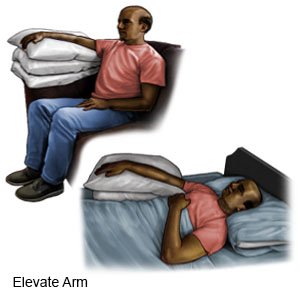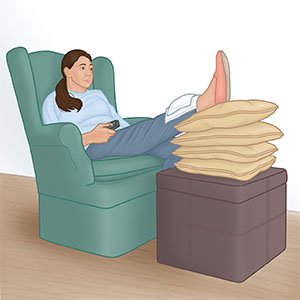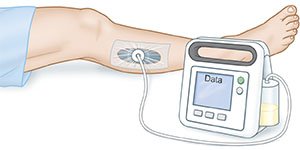Gunshot Wound to a Limb
Medically reviewed by Drugs.com. Last updated on Aug 4, 2025.
AMBULATORY CARE:
A gunshot wound (GSW) to a limb
may cause damage to your bones, tendons, or ligaments. It may also cause damage to your muscles, nerves, or major blood vessels.
Call your local emergency number (911 in the US) for any of the following:
- You feel lightheaded, short of breath, and have chest pain.
- You cough up blood.
- You have trouble breathing.
Seek care immediately if:
- Blood soaks through your bandage.
- Your wound comes apart.
- Your arm or leg is numb, pale, or cool to the touch.
- Your arm or leg feels warm, tender, and painful. It may look swollen and red.
Call your doctor if:
- You have a fever.
- Your wound is red, swollen, or draining pus.
- Your splint or cast falls off.
- You have nausea or are vomiting.
- Your pain is not relieved with pain medicine.
- You have questions or concerns about your condition or care.
Treatment for a minor GSW to a limb
depends on what is found on an x-ray, ultrasound, CT, or MRI. A GSW may be minor if it does not go deep into your skin or damage any of your organs or major blood vessels. Your healthcare provider may or may not remove the bullet. He or she may clean your wound and close it with stitches or staples. You may be given medicine to treat pain or prevent infection. You may also need a tetanus shot. Tetanus is a severe infection caused by bacteria. Tell your healthcare provider if you have had the tetanus vaccine or a tetanus booster within the last 5 years.
Treatment for a major GSW to a limb
may depend on how severe it is. You may need surgery or other procedures to treat complications of a GSW.
Self-care:
- Apply ice on your arm or leg for 15 to 20 minutes every hour or as directed. Use an ice pack, or put crushed ice in a plastic bag. Cover it with a towel. Ice helps prevent tissue damage and decreases swelling and pain.
- Elevate your arm or leg above the level of your heart as often as you can. This will help decrease swelling and pain. Prop your arm or leg on pillows or blankets to keep it elevated comfortably.


- Exercise as directed. Your healthcare provider may teach you exercises to strengthen the injured part of your limb. Exercises may also improve blood flow and prevent blood clots. You may need physical therapy.
- Do not lift anything heavy. Heavy lifting may place too much stress on your GSW. Ask your healthcare provider how much weight you can lift.
Wound care:
- Care for your wound as directed. Remove your bandage before showering unless your healthcare provider tells you not to. Carefully wash the wound with soap and water. Dry the area and put on new, clean bandages as directed. Change your bandages when they get wet or dirty. Monitor your wound for signs of infection such as redness, swelling, or pus.
- If you have an open wound, do not shower or get your wound wet. Your healthcare provider will tell you when your wound can get wet. Change the packing and bandage as directed. You may need to clean or rinse your wound each time you change the packing. Wash your hands before you remove packing and again before you place new packing. Ask your healthcare provider how to care for your open wound.
- Negative pressure wound therapy (NPWT) uses a machine called a wound vac, wound vacuum, or pump to help with wound healing. Suction from the machine removes excess drainage from your wound and pulls wound edges closer together. NPWT promotes healthy tissue growth by increasing blood flow to your wound. NPWT also reduce bacteria that cause infections. You and your healthcare providers will be taught about your specific NPWT machine, alarms, and dressing changes.

Get support:
It is normal to have difficult and unexpected feelings after being shot. You may have feelings such as anger, depression, fear, or anxiety. You may have nightmares or continue to think about what has happened. Talk to your healthcare provider if you have any of these feelings. Treatments are available to help you.
Follow up with your doctor as directed:
Write down your questions so you remember to ask them during your visits.
© Copyright Merative 2025 Information is for End User's use only and may not be sold, redistributed or otherwise used for commercial purposes.
The above information is an educational aid only. It is not intended as medical advice for individual conditions or treatments. Talk to your doctor, nurse or pharmacist before following any medical regimen to see if it is safe and effective for you.
Learn more about Gunshot Wound to a Limb
Care guides
Further information
Always consult your healthcare provider to ensure the information displayed on this page applies to your personal circumstances.
